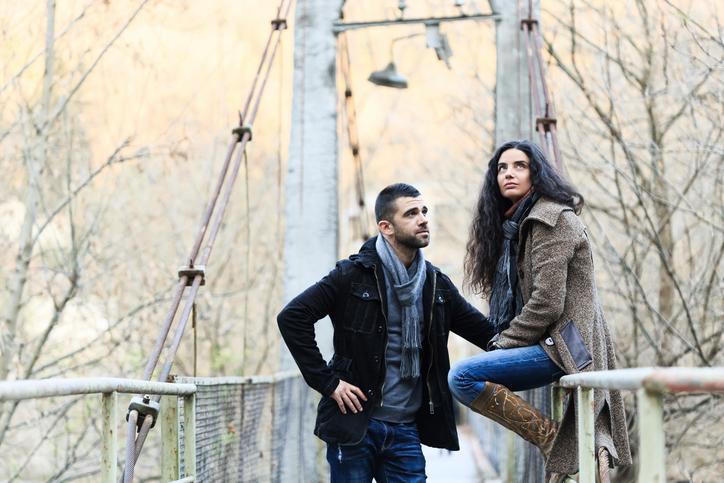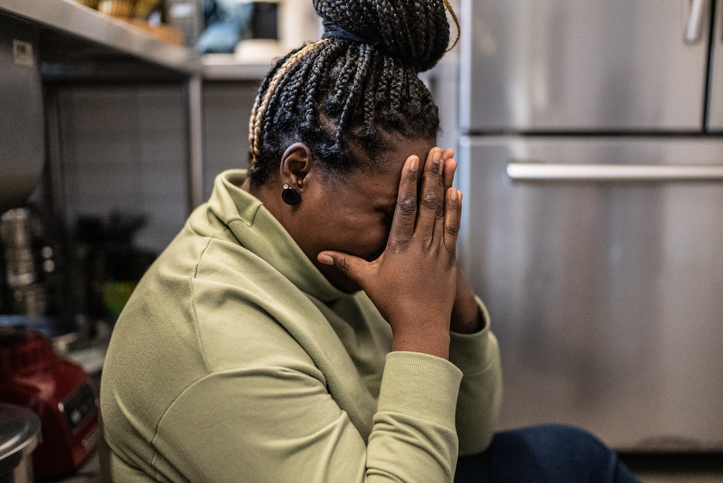It’s time to talk about something that affects more of us than we might realize: how childhood trauma sneaks its way into our adult relationships. But don’t worry, recognizing these patterns is the first step to healing and building healthier relationships. So let’s explore.
1. You’re always waiting for the other shoe to drop

If you find yourself constantly on edge, waiting for your partner to disappoint or leave you, childhood trauma is rearing its head. Even when things are going well, you brace for impact. This hypervigilance stems from early experiences of inconsistency or abandonment—your brain learned to stay alert for danger, and now it’s working overtime in your adult relationships. And that makes it hard for you to relax.
2. You have a hard time trusting your partner

Trust issues are like that annoying pop-up ad that won’t go away. According to Psych Central, if you grew up in an environment where trust was repeatedly broken, it’s no wonder you struggle with it now. You might find yourself constantly checking your partner’s phone, doubting their words, or assuming the worst. It’s not that you want to be this way, but your past experiences have trained you to be skeptical as a form of self-protection.
3. You’re a people-pleaser

If you find yourself bending over backward to make your partner happy, often at the expense of your own needs, childhood trauma might be pulling the strings. Maybe you grew up feeling like you had to earn love or keep the peace at all costs. Now, in your adult relationships, you struggle to set boundaries or express your own desires, fearing that any conflict will lead to rejection or abandonment.
4. You have a love-hate relationship with intimacy

Intimacy can feel like a double-edged sword when childhood trauma is in the mix. On one hand, you crave closeness and connection. On the other, getting too close feels terrifying. This push-pull dynamic can leave both you and your partner feeling confused and frustrated. It’s a clash between your heart—which is saying “Come closer”—and your trauma brain which is yelling “danger ahead!”
5. You’re always on an emotional roller coaster

If your emotions in relationships feel intense and unpredictable, childhood trauma could be the culprit. You might swing from extreme happiness to deep despair, or from clingy neediness to cold detachment. This instability comes from growing up in an environment where emotions were either overwhelming or suppressed. Your adult brain is still trying to figure out how to process and express feelings in a balanced way.
6. You have a hard time with uncertainty

Childhood trauma robs us of a sense of safety and predictability. As a result, you might struggle with uncertainty in your adult relationships. You might need constant reassurance about the future of the relationship, or you might avoid commitment altogether to avoid the anxiety of the unknown.
7. You’re drawn to familiar chaos

Find yourself attracted to partners who are unreliable, unavailable, or even abusive? It might seem counterintuitive, but sometimes we’re drawn to what feels familiar, even if it’s not healthy. If chaos or drama was a constant in your childhood home, you might subconsciously seek out similar dynamics in your adult relationships. You don’t want to be hurt, of course, it’s just that this feels “normal” to you.
8. You have a fear of abandonment that drives your actions

If the thought of your partner leaving you sends you into a panic, that could point to childhood trauma. This fear can manifest in clingy behavior, constantly seeking reassurance, or even pushing your partner away before they can leave you. It’s like your trauma brain is constantly preparing for the worst, even in a loving relationship.
9. You struggle with communication

Effective communication is crucial in relationships, but childhood trauma can throw a wrench in expressing your feelings. If you grew up in an environment where it wasn’t safe to share emotions, you might struggle to articulate your needs or feelings as an adult. Maybe you bottle things up until you explode, or avoid difficult conversations altogether.
10. You hate conflict

You might go to great lengths to avoid disagreements, or on the other hand, you might escalate small issues into major battles. This is because when you grow up in an environment where conflict is either constant and chaotic or completely suppressed, it’s confusing. Now, your adult brain might interpret any disagreement as a sign that the relationship is in danger.
11. You struggle with setting and respecting boundaries

Boundaries can be a foreign concept if you grew up in a home where your personal space and autonomy weren’t respected. As an adult, you may find it difficult to set healthy boundaries in your relationships, or you might swing to the other extreme and have rigid, inflexible boundaries.
12. You have a tendency to dissociate or ‘check out’

If you deal with childhood trauma, then there’s a good chance you find yourself mentally ‘checking out’ during stressful moments in your relationship. Dissociation was likely a coping mechanism you developed to deal with overwhelming situations as a child. Now, you disconnect when relationship stress hits a certain threshold, leaving your partner feeling like you’re not fully present.
13. You’re hyper-independent or overly dependent

Childhood trauma can skew your sense of interdependence in relationships. You might pride yourself on not needing anyone, pushing away help even when you need it. Or you might go to the other side, becoming overly reliant on your partner for emotional regulation and decision-making. Both extremes stem from early experiences where healthy dependence wasn’t modeled or allowed.
14. You struggle with shame and low self-worth

If you find yourself constantly feeling ‘not good enough’ in your relationships, childhood trauma might be feeding that shame. Maybe you grew up feeling flawed or unlovable. Now, these deep-seated beliefs about your self-worth sabotage your adult relationships, making it hard to accept love or believe that you deserve it in the first place.
15. You’re always seeking validation

Do you constantly need reassurance from your partner that you’re loved, attractive, or good enough? This insatiable need for validation has its roots in childhood experiences where love felt conditional or unpredictable. You’re trying to fill a bottomless pit of self-doubt that was dug a long, long time ago.








